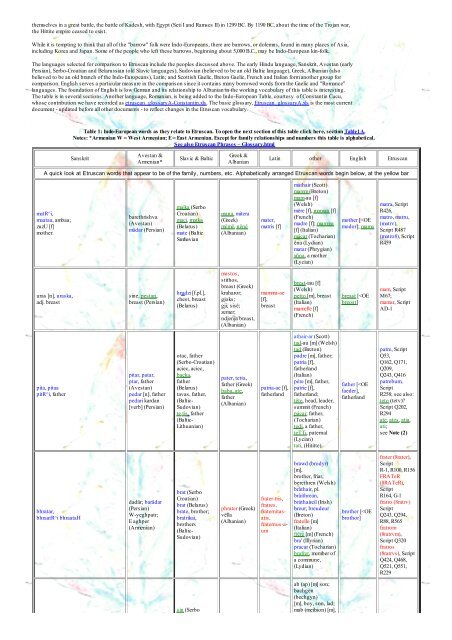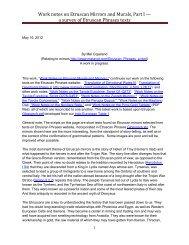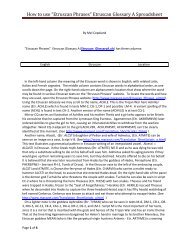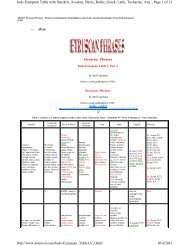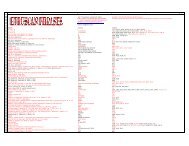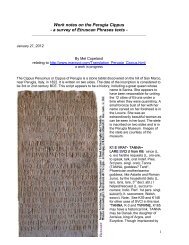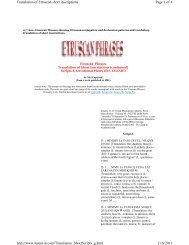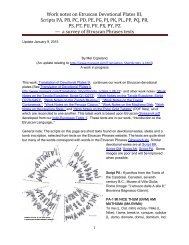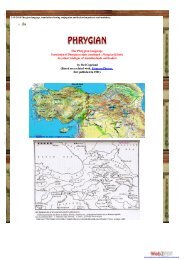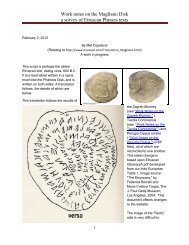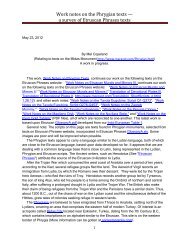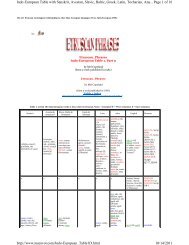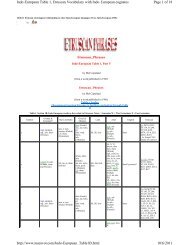Indo-European Table 1, Etruscan Vocabulary ... - maravot.com
Indo-European Table 1, Etruscan Vocabulary ... - maravot.com
Indo-European Table 1, Etruscan Vocabulary ... - maravot.com
Create successful ePaper yourself
Turn your PDF publications into a flip-book with our unique Google optimized e-Paper software.
themselves in a great battle, the battle of Kadesh, with Egypt (Seti I and Ramses II) in 1299 BC. By 1190 BC, about the time of the Trojan war,<br />
the Hittite empire ceased to exist.<br />
While it is tempting to think that all of the "barrow" folk were <strong>Indo</strong>-<strong>European</strong>s, there are barrows, or dolemns, found in many places of Asia,<br />
including Korea and Japan. Some of the people who left these barrows, beginning about 5,000 B.C., may be <strong>Indo</strong>-<strong>European</strong> kin-folk.<br />
The languages selected for <strong>com</strong>parison to <strong>Etruscan</strong> include the peoples discussed above. The early Hindu language, Sanskrit, Avestan (early<br />
Persian), Serbo-Croatian and Belarussian (old Slavic languages), Sudovian (believed to be an old Baltic language), Greek, Albanian (also<br />
believed to be an old branch of the <strong>Indo</strong>-<strong>European</strong>s), Latin; and Scottish Gaelic, Breton Gaelic, French and Italian form another group for<br />
<strong>com</strong>parison. English serves a particular measure in the <strong>com</strong>parison since it contains many borrowed words from the Gaelic and "Romance"<br />
languages. The foundation of English is low German and its relationship to Albanian in the working vocabulary of this table is interesting.<br />
The table is in several sections. Another language, Romanian, is being added to the <strong>Indo</strong>-<strong>European</strong> <strong>Table</strong>, courtesy of Constantin Cucu,<br />
whose contribution we have recorded as etruscan_glossaryA-Constantin.xls. The basic glossary, <strong>Etruscan</strong>_glossaryA.xls is the most current<br />
document - updated before all other documents - to reflect changes in the <strong>Etruscan</strong> vocabulary.<br />
<strong>Table</strong> 1: <strong>Indo</strong>-<strong>European</strong> words as they relate to <strong>Etruscan</strong>. To open the next section of this table click here, section <strong>Table</strong>1A.<br />
Notes: *Armenian W = West Armenian; E = East Armenian. Except for family relationships and numbers this table is alphabetical.<br />
See also <strong>Etruscan</strong> Phrases – Glossary.html<br />
Sanskrit<br />
Avestan &<br />
Armenian*<br />
Slavic & Baltic<br />
Greek &<br />
Albanian<br />
Latin other English <strong>Etruscan</strong><br />
A quick look at <strong>Etruscan</strong> words that appear to be of the family, numbers, etc. Alphabetically arranged <strong>Etruscan</strong> words begin below, at the yellow bar<br />
matR^i,<br />
maataa, ambaa;<br />
zuzU [f]<br />
mother.<br />
uras [n], uraska,<br />
adj. breast<br />
pita, pitaa<br />
pitR^i, father<br />
bhratar,<br />
bhraatR^i bhraataH<br />
barethrishva<br />
(Avestan)<br />
mâdar (Persian)<br />
sine, pestan,<br />
breast (Persian)<br />
pitar, patar,<br />
ptar, father<br />
(Avestan)<br />
pedar [n], father<br />
pedari kardan<br />
[verb] (Persian)<br />
dadär; barâdar<br />
(Persian)<br />
W-yeghpatr;<br />
E aghper<br />
(Armenian)<br />
majka (Serbo<br />
Croatian)<br />
maci, matka<br />
(Belarus)<br />
mate (Baltic<br />
Sudovian<br />
hrudzi [f.pl.],<br />
chest, breast<br />
(Belarus)<br />
otac, father<br />
(Serbo-Croatian)<br />
aciec, aciec,<br />
baçka,<br />
father<br />
(Belarus)<br />
tavas, father,<br />
(Baltic-<br />
Sudovian)<br />
te.tis, father<br />
(Baltic-<br />
Lithuanian)<br />
brat (Serbo<br />
Croatian)<br />
brat (Belarus)<br />
brate, brother;<br />
bratrikai,<br />
brothers<br />
(Baltic-<br />
Sudovian)<br />
sin (Serbo<br />
mana, mitera<br />
(Greek)<br />
mëmë, nënë<br />
(Albanian)<br />
mastos,<br />
stithos,<br />
breast (Greek)<br />
kraharor;<br />
gjoks;<br />
gji; sisë;<br />
zemer;<br />
ndjenja breast,<br />
(Albanian)<br />
pater, tetta,<br />
father (Greek)<br />
baba, ate,<br />
father<br />
(Albanian)<br />
phrater (Greek)<br />
vëlla<br />
(Albanian)<br />
mater,<br />
matris [f]<br />
mamma-ae<br />
[f],<br />
breast<br />
patria-ae [f],<br />
fatherland<br />
frater-tris,<br />
fratres,<br />
fraternitasatis,fraternus-aum<br />
màthair (Scott)<br />
mamm (Breton)<br />
mam-au [f]<br />
(Welsh)<br />
mère [f], maman [f]<br />
(French)<br />
madre [f]; mamma<br />
[f] (Italian)<br />
mácar (Tocharian)<br />
êna (Lydian)<br />
matar (Phrygian)<br />
xñna, a mother<br />
(Lycian)<br />
brest-iau [f]<br />
(Welsh)<br />
petto [m], breast<br />
(Italian)<br />
mamelle [f]<br />
(French)<br />
athair-ar (Scott)<br />
tad-au [m] (Welsh)<br />
tad (Breton)<br />
padre [m], father;<br />
patria [f],<br />
fatherland<br />
(Italian)<br />
père [m], father,<br />
patrie [f],<br />
fatherland;<br />
tête, head, leader,<br />
summit (French)<br />
pácar, father,<br />
(Tocharian)<br />
tedi, a father,<br />
teTTi, paternal<br />
(Lycian)<br />
tati, (Hititte)<br />
brawd (brodyr)<br />
[m],<br />
brother, friar,<br />
berethren (Welsh)<br />
bràthair, pl.<br />
bràithrean,<br />
bràthaireil (Irish)<br />
breur, breudeur<br />
(Breton)<br />
fratello [m]<br />
(Italian)<br />
frère [m] (French)<br />
bra' (Illyrian)<br />
pracar (Tocharian)<br />
brafrer, member of<br />
a <strong>com</strong>mune,<br />
(Lydian)<br />
ab (ap) [m] son;<br />
bachgen<br />
(bechgyn)<br />
[m], boy, son, lad;<br />
mab (meibion) [m],<br />
mother [


